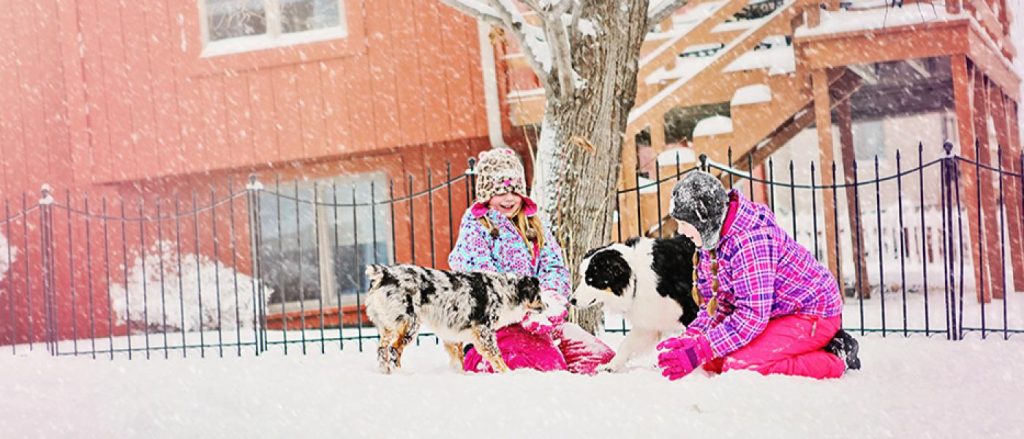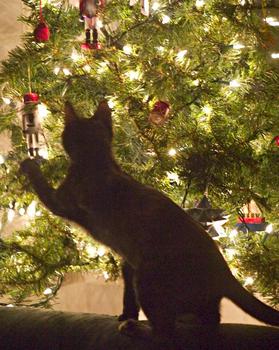Winter and Holiday Pet Safety Tips

Dropping temperatures often means you and your pets may find yourselves indoors more than usual. The month of December can also present unique challenges for young or “new to you” pets in terms of schedule changes and holiday decorations.
With the first day of Winter approaching (Dec. 22) it’s also “Keep Pets Safe in Winter Day.” It’s a reminder to us of the hazards of the season.
You may think of the usual outdoor concerns such as making sure your pets steer clear of antifreeze and chemical de-icers – more on those in a minute – yet the indoor arena presents its own challenges.
Cords, Gift Wrapping and Tinsel – It Must Be the Holidays!
If you have older pets who have been with you through multiple holiday seasons, they may snooze through the gift wrapping and guests with barely a raised eyebrow.
On the other hand, if you have young pets, or even “new to you” pets, you’ll want to take precautions as you see how they behave.
Christmas Trees – Talk about excitement and confusion. You’re bringing a tree inside and hang it with shiny objects that swing about when batted. It smells good, it’s unusual and you’re giving it a lot of attention.

All of that makes it of interest to some pets. That interest may range from kittens batting ornaments off of it to jumping into the tree. Dogs may be delighted that you’ve brought them indoor plumbing.
Only they know what goes on in their minds.
Until you know your pet’s reactions, here are a few precautions.
- Leave low branches empty — Don’t hang ornaments on low branches where they may tempt your furry friends to chew on them or knock them onto the floor. Delicate ornaments can break and cut your curious pets.
- Don’t leave them unattended — Make sure your pets can’t access the tree easily when you’re not home. I’m sure you’ve heard of at least one story of a pet knocking over a Christmas tree. Or dogs who’ve chosen to forget their indoor manners – if you know what I mean.
- Don’t use tinsel in your decorations. Animals who chew on tinsel can end up at the emergency vet. Why? Because the strands can twist around their internal organs and cause major damage. It’s not worth the risk.
Other Potential Indoor Hazards
- Open flames from candles – keep them out of the way of wagging tails and curious kittens. It only takes a second for a disaster to occur.
- Extension cords or electric throws/blankets – Chewing electric cords can electrocute your pet. Veterinarians say it’s quite common so please make sure your pet doesn’t have access to these.
- Space heaters – Pets get too close and get burned. It’s also easy to knock over space heaters which can even start a fire. Use them with caution and only when you’re home.
Brrr…It’s Cold Outside
When the temperatures settle in the low ‘30’s or below, there are dangers of the elements for both humans and pets. Earlier I mentioned the dangers of antifreeze and chemical de-icers.
You may be familiar with these but in case you’re not, it’s important to realize the hazards.
- Antifreeze is a magnet for pets. They like the taste of it and it’s poisonous. So make sure that the lids are on tight and out of reach of curious pets. It’s also important to clean up any antifreeze that may spill or leak from your car as it doesn’t take much of the stuff to trigger a reaction – especially in small animals.
- Paw Pads take a beating. They’re exposed to the elements outside which means snow and ice crystals can lodge themselves deep in the nooks and crannies of your pet’s paws. So can chemical de-icers which you or your neighbors may use to keep your steps, driveway and sidewalk clear of ice.
The de-icers themselves are usually made of calcium chloride (a form of salt) which can burn your pet’s paws – and mouth when they lick their paws clean.
Your best protection is to use a combination of dog boots and to rinse off your dog’s legs and underbelly (if your pet has long fur) when you come in from outside. A towel, a brush and a pan of warm water (for legs/paws) will help keep your pet clean and free of harsh chemicals. It won’t, however, prevent your pet‘s paws from dryness. For combating dry and flaky paw pads, a pet safe moisturizing balm is useful.
- Dog Coats and sweaters benefit short haired dogs. Short haired dogs don’t have the extra fur of winter breeds to keep themselves warm so they’re at a disadvantage. Sweaters and dog coats come in all sizes. Even your Mastiff can stop shivering and stay warm in the winter with an extra layer.
- Be Visible – The winter darkness puts you and your dog at risk when you’re walking. Use a reflective leash or winter clothes with reflective stripes to stay visible to cars, bikers and other pedestrians.
In extreme temperatures, frostbite and hypothermia can affect your pets. In such weather, your best bet is to protect paws with dog booties and keep walks short.
How will you protect your pets this winter?




